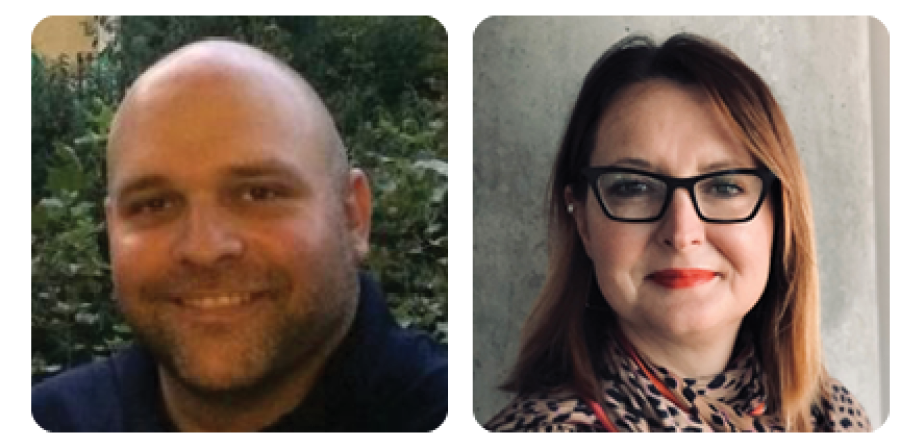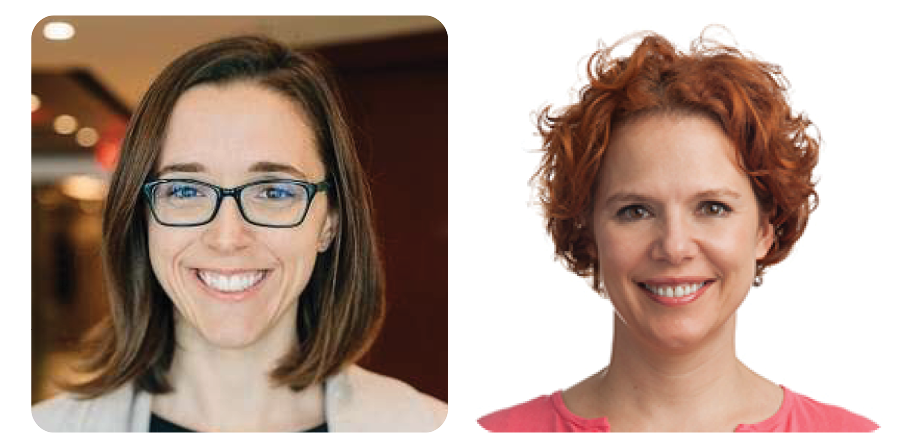Highlights and Resources

Program Speakers Highlights and Resources

OMSSA hosted more than 450 human and public services leaders from across the province for our first-ever Virtual Policy Conference on December 2-3, 2020. Thank you to all of those who attended, engaged, and helped make the conference a success.
We've rounded up presentations and resources, as well as some of our favourite insights and reactions from each of our conference sessions below. Have a look and click to expand and view highlights from each session.
WEDNESDAY, DECEMBER 2
The Story of Now: Shaping Today's Narratives to Chart a Course for the Post-COVID World
 In this thought-provoking keynote, head of Spitfire Strategies Kristen Grimm explored the power of narrative in shaping our post-COVID world. Kristen walked participants through three key elements of the COVID narrative, from why it happened, what we did in the face of it, and how we are coming out of it, inviting delegates to explore how alternate or competing storylines in each of those areas can have a significant impact on shaping what comes next. Read Kristen's article in the Stanford Social Innovation Review.
In this thought-provoking keynote, head of Spitfire Strategies Kristen Grimm explored the power of narrative in shaping our post-COVID world. Kristen walked participants through three key elements of the COVID narrative, from why it happened, what we did in the face of it, and how we are coming out of it, inviting delegates to explore how alternate or competing storylines in each of those areas can have a significant impact on shaping what comes next. Read Kristen's article in the Stanford Social Innovation Review.
Audience Insights:
"The message and story we tell must reflect that the economy and health are very connected."
"There is no economy without public health. The social determinants of health matter, and we need to invest in those for a healthy economy."
"The pandemic widened the gap between the haves and have nots. When we want to jump start the economy, governments need to invest in low wage earners. Why can't we do this in the good times too?"
"We acknowledged the inequities and began a process to response, invest, and include."
"We learned the importance of front line workers - healthcare for sure, but also retail, grocery clerks. Essential services might have a greater definition, including child care and education, and their potential for economic value."
Reactions:
"Public Relations is the conscience of an organization, and this presentation really appealed to that. Loved it."
"Thought provoking and challenging to all of us to re-write the story."
Building Equity into Renewal: From Talk to Action

This candid panel discussion explored how we can move from talk to action to implement concrete, meaningful and permanent changes to achieve anti-racist outcomes, and to decolonize human services to ensure all citizens we serve are part of an equity-focused renewal.
Moderator Cordelia Abankwa, York Region's General Manager of Social Services, guided panelists through a conversation that invited leaders to reflect on their role in building equity into renewal in our organizations and our sector.
Panelists included: Keith Palmer, Assistant Deputy Minister, Ontario Ministry of Children, Community and Social Services; Waheeda Rahman White, Director of Equity, Diversity and Human Rights, City of Toronto; Dr. Lisa Richardson, Vice-Chair, Culture and Inclusion, Department of Medicine, University of Toronto; and Strategic Lead in Indigenous Health, Women‘s College Hospital and Faculty of Medicine, University of Toronto; and Daniele Zanotti, President and CEO, United Way of Greater Toronto.
Key takeaways included the importance of 'deep listening', avoiding jumping into 'problem-solving mode' when hearing about team members' experiences, the importance of acknowledging what we don't know or are still learning as leaders, and the importance of building conversations about equity into onboarding and orientation processes in our organizations.
Participants actively added to the discussion through the chat, sharing resources that they have found helpful in furthering their own learning and reflection, including the books Me and White Supremacy by Layla F. Saad, and White Fragility by Robin Diangelo.
Audience Insights:
"When we listen to learn instead of to respond, we make great strides in pursuit of equality and diversity."
"I think one of the issues with some organizations is that their espoused values are not consistent with their actions and they don't 'walk the talk.' A key element to ensure values translate into day-to-day practice is to increase accountability."
"We can't treat everyone the same and we need to recognize our differences. I would argue that not only do we need to do this work when onboarding new staff but that we need to incorporate this into our performance evaluations. You cannot provide the best advice, or serve the public, when you are unwilling to understand your position of power, and how your work impacts the lives of others - in particular vulnerable communities. We need to evaluate leaders on how they are performing with respects to creating opportunities for their staff, and how their service area is supporting Black, Indigenous and racialized people."
Reactions:
"Thoughtful, informative and critical conversation."
"A powerful conversation about inclusive leadership and practicing deep listening while embracing the authentic 'I don't know'."
"One of the best discussions on equity I‘ve ever had the pleasure of being a part of."
"Electric!"
Health and Human Services Integration: Keeping 2020's Momentum Alive
 This interactive panel discussion included service system managers and health experts, who joined us to unpack the lessons of 2020 and strategize about how to build on their progress, and how to seize this opportunity to create lasting collaborative partnerships.
This interactive panel discussion included service system managers and health experts, who joined us to unpack the lessons of 2020 and strategize about how to build on their progress, and how to seize this opportunity to create lasting collaborative partnerships.
Moderator Najma Kahiye, Policy Development Officer with the City of Toronto, guided a discussion that explored how local relationships between health and human services providers changed with the pandemic, what lessons were learned, and how we can work to ensure that we don't revert back to a siloed model after the pandemic.
Panelists included: John Riches, MPPAL, Deputy Chief, Regulatory Compliance & Administration, Region of Durham Paramedic Services, Health, Regional Municipality of Durham; Erin Valant, Program Manager, Affordable Housing & Homelessness Initiatives, Regional Municipality of Durham; Dr. Fareen Karachiwalla, Associate Medical Officer of Health, Regional Municipality of York; and Mike Nadeau, CAO, District of Sault Ste. Marie DSSAB.
Key takeaways included the need to understand the different 'languages' used by the health and social services sectors, the role that relationships play in bridging gaps across sectors, and the need to also move beyond this to 'institutionalize' these relationships within our organizations.
Polling Results:
How would you characterize the degree of collaboration between health and human services sectors in your community prior to COVID-19?
- Limited / infrequent: 15%
- Intermittent / as needed: 39%
- Moderate / emerging: 28%
- Strong / frequent: 14%
How has this changed, if at all, since the onset of COVID-19?
- Decreased significantly: 6%
- Decreased somewhat: 12%
- Stayed the same: 15%
- Increased somewhat: 36%
- Increased significantly: 24%
Audience Insights:
"I completely support the idea of health/human services integration, and I'm happy this has accelerated through COVID. I am wondering though, how likely is it that this work can progress without adequate social safety net programs. How can health and social services work together to urgently advocate for an adequate social foundation from which to make this collaboration effective for clients?"
"Inter-ministerial dialogue and policy review, especially between the Ministry of Children, Community and Social Services and Ontario Public Health is critical to facilitate successful social assistance modernization and integration."
Reactions:
"Interesting and informative. The panelists did a wonderful job and would love to see them back for future sessions."
"The speakers' real-world, concrete and specific examples of work done during the pandemic were very useful."
THURSDAY, DECEMBER 3
Economic Recovery: The Path Forward

In this lively and engaging panel discussion, moderator John Michael McGrath, Digital Media Producer at TVOntario (TVO) led a compelling conversation, inviting panelists Mitchell Davidson, Executive Director of the StrategyCorp Institute of Public Policy and Economy and Armine Yalnizyan, Atkinson Fellow on the Future of Workers to share their views on big picture questions like:
What kind of changes to social programs should we see after the pandemic, if any?
Social services in Ontario are heavily dependent on local governments who may be most cash-strapped of all. Is it time once again to talk about reorganizing who does what in Ontario, and who pays?
Are tax increases inevitable?
How likely are big, radical changes in social policy after the pandemic has passed?
Audience Insights:
"If trickle-down economics was going to work, it already would have!"
"The ONLY thing governments are not capable of is what they don't want to do."
Reactions:
"Loved the honesty and richness of this conversation."
"Wow! This was a fantastic session, so pumped to advocate (and plan) for real change!"
"The interplay was excellent and it illustrated that there's more to agree on than not."
"The panelists and moderator did a truly wonderful job at helping us to anticipate what is likely to come, what the data is showing, and what the opportunities are."
"This trio kept it engaging, genuine and challenging. I would watch/listen to them hash it out any time."
Social Assistance Recovery and Renewal: Co-Designing Transformation

This session sought to address key unanswered questions about the futute of social assistance recovery and renewal. Participants heard from the Ontario Ministry of Children, Community and Social Services (MCCSS) on the Province's emerging vision for Social Assistance Recovery and Renewal currently in development with municipalities. Next, municipalities involved in developing and testing the new centralized, risk-based approach to Ontario Works intake shared their perspectives on the approach, the co-design process and initial experience with implementation. Finally, representatives from the Ontario Ministries of Labour, Training and Skills Development and MCCSS shared an overview of approaches to common assessment. Speakers included:
- Nelson Loureiro, Assistant Deputy Minister, Social Assistance Policy, Planning and Innovation, Ontario Ministry of Children, Community and Social Services
- Polly Smith, Director, Employment & Social Services, Municipality of Chatham-Kent
- Jeff Degagne, Manager of Income Support and Stability, District of Parry Sound Social Services Administration Board
- Erica Brimley, Human Service Manager Of Ontario Works, Healthy and Safe Communities, Ontario Works, City of Hamilton
- Margo Bohemier, Ontario Works Site Supervisor, Social Services Department, County of Renfrew
- Santina Macri, Senior Manager, Program Delivery Support Branch, Employment and Training Division, Ontario Ministry of Labour, Training and Skills Development
- Alissa Savage, Senior Manager (Acting), Employment Services Transformation Unit, Ontario Ministry of Children, Community and Social Services
Resources:
Audience Insights:
"We can benefit from innovative ways to ensure that everyone can access. Part of this means supporting people with learning and gaining digital literacy so they are able to access services that are moving to more virtual or online platforms."
"Access and connectivity barriers are compounded by affordability for vulnerable populations for internet and data plans. Innovative solutions with business to provide affordable, accessible and connected IT solutions for this population is required. Work provincially on this front would be helpful to ensure this population can keep up with the level of transformation in Social Assistance."
"This is an opportunity for better human services integration. Hopefully will be able to bridge the privacy/consent between housing, child care, etc. so one holistic view of each person is possible."
Reactions:
"Perfect timing to share this information."
"Very helpful to hear first-hand from the sites involved in prototyping about their experience."
"Practical and hands-on explanation from those currently making the changes."
Affordable Housing Now: Early Insights on Modular and Rapid Housing Initiatives
 With the recent announcement of the $1 billion Rapid Housing Initiative (RHI), municipalities, non-profit housing providers and Indigenous organizations are working quickly to prepare project plans and applications. This session was designed to support service managers currently preparing applications under the RHI Projects Stream.
With the recent announcement of the $1 billion Rapid Housing Initiative (RHI), municipalities, non-profit housing providers and Indigenous organizations are working quickly to prepare project plans and applications. This session was designed to support service managers currently preparing applications under the RHI Projects Stream.
Participants heard from Lance Arnold, Senior Specialist with the Canada Mortgage and Housing Corporation (CMHC) on how to prepare the strongest application possible. Next, Executive Director of the City of Toronto's Housing Secretariat Abigail Bond shared learnings and advice on pursuing modular and other rapid supportive housing projects, from getting up to speed on modular best practices, to managing approvals and public dialogue under tighter timelines.
Resources:
View CMHC's Slide Deck on the Rapid Housing Initiative (PDF)
View the City of Toronto's Slide Deck on Modular and Rapid Housing Initiatives (PDF)
Visit the City of Toronto's website for modular housing information and resources
Visit CMHC's website for information on the Rapid Housing Initiative (RHI)
Watch a recording of CMHC's informational webinar on the Rapid Housing Initiative
Polling Results:
Poll results may not add up to 100% due to structure of question or not including "N/A" response.
Which type of project do you plan to pursue as part of your RHI application?
- New / modular construction: 23%
- Portfolio of projects: 10%
- Acquisition and conversion of non-residential properties: 9%
- Acquisition and rehabilitation of non-habitable residential properties: 1%
Do you plan to provide supportive services to tenants as part of this project?
- Yes: 21%
- No: 4%
- Unsure / Still deciding: 15%
Is your organization able to allocate funding to sustain supportive services and / or operational costs for this project?
- Yes: 14%
- No: 6%
- Unsure / Still deciding: 25%
What are the biggest challenges or potential obstacles your organization faces with respect to pursuing a rapid or modular housing initiative? (Check all that apply):
- Lack of funding (for supportive services or operational costs): 31%
- Timelines: 23%
- Lack of funding (for cost-sharing of capital costs): 21%
- Gaining political support: 14%
- Gaining community support: 14%
- Securing partnerships to provide supportive services: 14%
- Lack of available buildings: 13%
- Lack of available land: 10%
- Lack of expertise: 5%
Reactions:
"Lots of great information shared."
Universal Child Care: Lessons from Quebec
 With child care on policy agendas at all levels of government like never before, this timely session explored lessons learned from Quebec's universal child care program and the impact of the program on parents and children. After hearing from speakers Dr. Catherine Haeck (Associate Professor at University of Quebec in Montreal) and Marie-Claude Lemieux (Director of Public and Government Affairs at the Association Québécoise des Centres de la Petite Enfance), OMSSA Board Member and Wellington County's Director of Children's Services Luisa Artuso led a discussion on topics like quality differences between public and semi-private systems, program costs, and advice for the federal government as they plan their National Child Care Strategy.
With child care on policy agendas at all levels of government like never before, this timely session explored lessons learned from Quebec's universal child care program and the impact of the program on parents and children. After hearing from speakers Dr. Catherine Haeck (Associate Professor at University of Quebec in Montreal) and Marie-Claude Lemieux (Director of Public and Government Affairs at the Association Québécoise des Centres de la Petite Enfance), OMSSA Board Member and Wellington County's Director of Children's Services Luisa Artuso led a discussion on topics like quality differences between public and semi-private systems, program costs, and advice for the federal government as they plan their National Child Care Strategy.
Resources:
Report: The Quality of Educational Child Care Services in Quebec (PDF)
Research Snapshot: Measuring Child Care Quality in Quebec (PDF)
Dr. Catherine Haeck also shared the names of fellow researchers whose work was relevant to the session's discussion:
Christa Japel (University of Quebec in Montreal)
Nathalie Bigras (University of Quebec in Montreal)
Audience Insights:
"I wonder if the way the universal child care is being framed will impact our ability to implement a high quality system. If we frame it as a way of promoting increased workforce participation, then do the decision-makers understand the value of high quality child care and is it a priority in the system?"
"Relevant data is needed, as well as buy-in from local councils and the Province. We also need to advocate for the importance of early years and its return on investment."
Reactions:
"Intelligent, rooted in practice, concrete discussion. Loved it."
"Would love to know more. Would be great to bring the speakers back to dig deeper."
Fireside Chat with Deputy Ministers: The Future, Together

The concluding session of the conference brought Deputy Ministers together at the end of a challenging but game-changing year to discuss the future of public service and provincial-municipal partnerships.
Moderator Cordelia Abankwa, York Region's General Manager of Social Services, guided the discussion and invited panelists to reflect on the lessons of 2020, and insights for current and emerging leaders about how municipalities can remain value-added partners in the years ahead, and what kind of partners they want their ministries to be. Panelists included:
Kate Manson-Smith, Deputy Minister, Ontario Ministry of Municipal Affairs and Housing
Janet Menard, Deputy Minister, Ontario Ministry of Children, Community and Social Services
Nancy Naylor, Deputy Minister, Ontario Ministry of Education
Richard Steele, Deputy Minister, Ontario Ministry of Long-Term Care
The engaging and candid discussion offered a chance for both panelists and participants to reflect on what it means to be a leader in public services, particularly through times of challenge and change.
Polling Results:
Do you believe you have grown as a leader in new, unexpected ways in 2020?
- Yes: 75%
- No: 2%
- Somewhat: 23%
Reactions:
"This session left me very optimistic for the continuing partnership between the province and municipalities. The relationship between the two levels has come a long way and it was great to hear that it is likely to continue."
"Really appreciate the panelists' candor and the time they took to share insights and advice."
